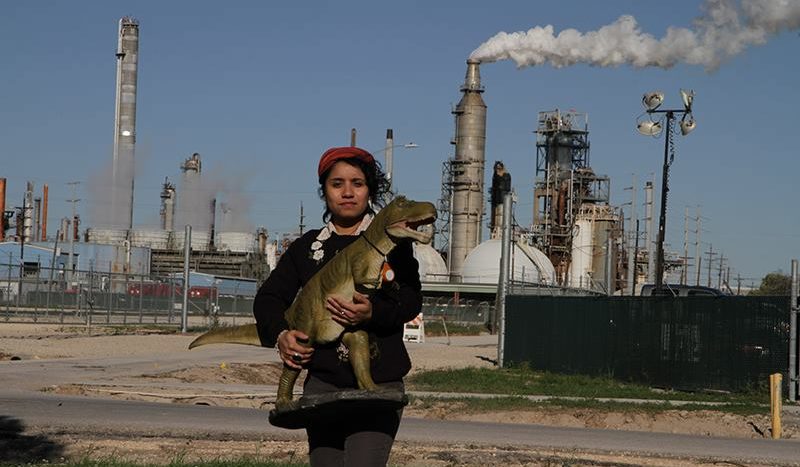In the weeks since Hurricane Harvey hit, the primarily Latinx and Black neighborhoods located along the Houston Ship Channel have been dealt a double-blow. Already living in cancer clusters in the shadow of one of the world’s largest petrochemical hubs, they now face the steep costs of a toxic clean-up they cannot afford.
TEJAS (Texas Environmental Justice Advocacy Services), the oldest environmental justice organization in Houston, has launched the Harvey Recovery Fund to help support clean-up and long-term recovery efforts in frontline communities. Please make a donation here.
Last year, The Natural History Museum worked with TEJAS on an exhibition, citizen science air-monitoring project, and program of monthly “Toxic Tours” of Houston’s oil refineries, chemical plants, Superfund sites, and coal-powered plants. In the wake of the recent storm, spills, explosions and toxic plumes from those facilities have further contaminated low-income communities living on the fence-line of industrial zones.
To learn more about how environmental injustice plays out in Houston, check out video and photos from the exhibition.
In the weeks since Harvey, hurricanes have continued to wreak havoc on Florida, Puerto Rico, and the Caribbean. As the effects of climate change continue to unfold, extreme weather events will only become more frequent. It is groups on the ground like TEJAS that have fought for years to serve the most vulnerable communities that deserve our full support.
As Professor Robert Bullard, a Houston-based scholar known as the ‘father of environmental justice’ has said, “the environment is everything: where we live, work, play, go to school — both the physical and natural world. We cannot separate the physical environment from the cultural environment. And so justice must be integrated throughout all that we do.”
In this time of profound environmental change, science and nature museums must stand up for environmental justice. That is why The Natural History Museum is partnering with other science and nature museums across the country to develop new exhibits and public programs in collaboration with scientists and communities on the frontlines of environmental crises and climate change.
Please consider donating to the TEJAS Harvey Recovery Fund. And thank you for keeping up with The Natural History Museum. Together we can unleash the powers of science, education, storytelling, and community-based action.
For the future,
The Natural History Museum

